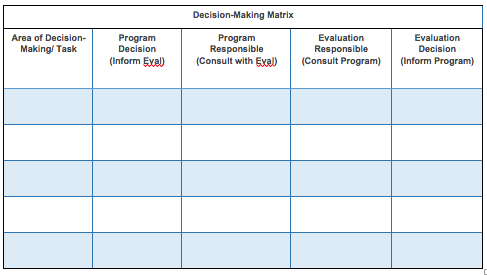I’m Jenny McCullough Cosgrove, Managing Director of Noesis Consulting, and self-proclaimed #EvalNerd, currently serving at the President-Elect for the Arizona Evaluation Network. I came to evaluation via social work and neuropsychology (a heady mix, to be sure). My most successful evaluation projects have been categorized by strong working relationships with program staff. Adam Horvath wouldn’t be surprised by that fact. He recognized how critical relationships were to the success of a project and even developed a working alliance inventory for use in psychotherapy. These working relationships are equally important for an evaluator to develop with program staff. Being mindful and planful in developing a strong working alliance will set an evaluation (and evaluator) up for success.
 Hot Tip: Start with role clarity
Hot Tip: Start with role clarity
A key component of a strong working alliance is role clarity. Use the task of clarifying roles and tasks as an opportunity to connect and create a shared vision for your project. Review roles and tasks regularly with your client to increase attention and commitment.
Cool Tricks: Using a decision-making matrix as a relationship developer and to develop mutual project-related tasks
Co-create a decision-making matrix! The Evaluation Nerd Blog recently shared an easy tool to use to develop and sustain good working relationships by clarifying the roles and responsibilities of an evaluation. This tool is most useful when it is completed by the evaluator and program manager together (either in person or over video chat). Start by brainstorming key tasks in the project. Then discuss responsibilities and communication. Read more about the steps to completing the matrix in the blog post.

Hot Tip: Check In Regularly
At the end of each meeting, review the meeting content and any decisions that were made. Repeat actions and activities that are your responsibility. Check in on how your client is feeling and ask if there is anything that wasn’t addressed or that they need from you that they still have on their mind. If there are lingering questions are issues, explicitly address how they will be attended to (e.g., put at the top of the agenda for the next evaluation meeting, follow-up email, ad hoc meeting, etc). This doesn’t necessarily mean more work for you, it just provides an opportunity for you to check in on your client’s expectations for further relationship management.
Rad Resources:
Ready to build your capacity for relationship building? Check out the Arizona Evaluation Network’s 2018 From Learning to Practice: Using Evaluation to Address Social Equity conference taking place this April in Tucson, AZ.
The Partnership Handbook by Flo Frank and Anne Smith is a fantastic resource to support internal reflection on your working partnerships.
The Harvard Business Review provides a step-by-step guide to building collaborative alliances.
Get Involved: Let’s continue the conversation! Tweet how you develop strong #eval working relationships using the hashtag #EvalAlliance
The American Evaluation Association is celebrating Arizona Evaluation Network (AZENet) Affiliate Week. The contributions all this week to aea365 come from our AZENet members. Do you have questions, concerns, kudos, or content to extend this aea365 contribution? Please add them in the comments section for this post on the aea365 webpage so that we may enrich our community of practice. Would you like to submit an aea365 Tip? Please send a note of interest to aea365@eval.org. aea365 is sponsored by the American Evaluation Association and provides a Tip-a-Day by and for evaluators.
